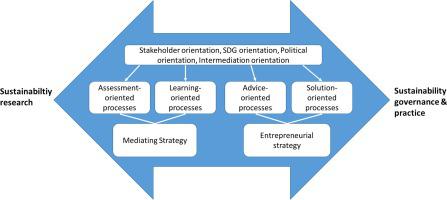Global Environmental Change ( IF 8.9 ) Pub Date : 2021-07-19 , DOI: 10.1016/j.gloenvcha.2021.102314 Ulrike Zeigermann 1

|
Understanding how science, technology and innovation can best help to accelerate progress in achieving sustainable development remains a grand challenge for researchers and practitioners. In the context of the global consultation process for preparing a post-2015 Sustainable Development Agenda, various science-based actor networks have emerged, aiming to translate research into political decision-making and to inform transformations towards sustainability. Over the last years, these networks seem to have taken an ever-growing role in structuring the science-policy interface in global sustainability governance. The question arises, however, how they understand and organize ‘scientific knowledge integration’ in sustainability politics.
This study offers a structured comparison of twelve global science-based actor networks engaged in the implementation of the Sustainable Development Goals. It shows that these networks use two types of strategies to foster scientific knowledge integration in sustainability governance. A new framework emerges, in which each strategy corresponds to two main approaches of scientific knowledge integration: The entrepreneurial strategy generally seeks to advance advice-oriented and solution-oriented knowledge processes, while assessment-oriented and learning-oriented processes in scientific knowledge integration are mainly promoted through a mediating strategy.
中文翻译:

通过基于科学的行动者网络在可持续发展治理中进行知识整合
了解科学、技术和创新如何最好地帮助加快实现可持续发展的进程仍然是研究人员和从业人员面临的巨大挑战。在准备 2015 年后可持续发展议程的全球磋商进程中,出现了各种以科学为基础的行动者网络,旨在将研究转化为政治决策,并为实现可持续发展的转型提供信息。在过去几年中,这些网络似乎在构建全球可持续性治理中的科学政策界面方面发挥了越来越大的作用。然而,问题出现了,他们如何理解和组织可持续性政治中的“科学知识整合”。
本研究对参与实施可持续发展目标的十二个全球科学行动者网络进行了结构化比较。它表明这些网络使用两种类型的策略来促进可持续治理中的科学知识整合。一个新的框架出现了,其中每个战略对应于科学知识整合的两种主要方法:创业战略通常寻求推进以建议为导向和以解决方案为导向的知识过程,而科学知识整合中以评估为导向和以学习为导向的过程是主要是通过调解策略来促进。


























 京公网安备 11010802027423号
京公网安备 11010802027423号